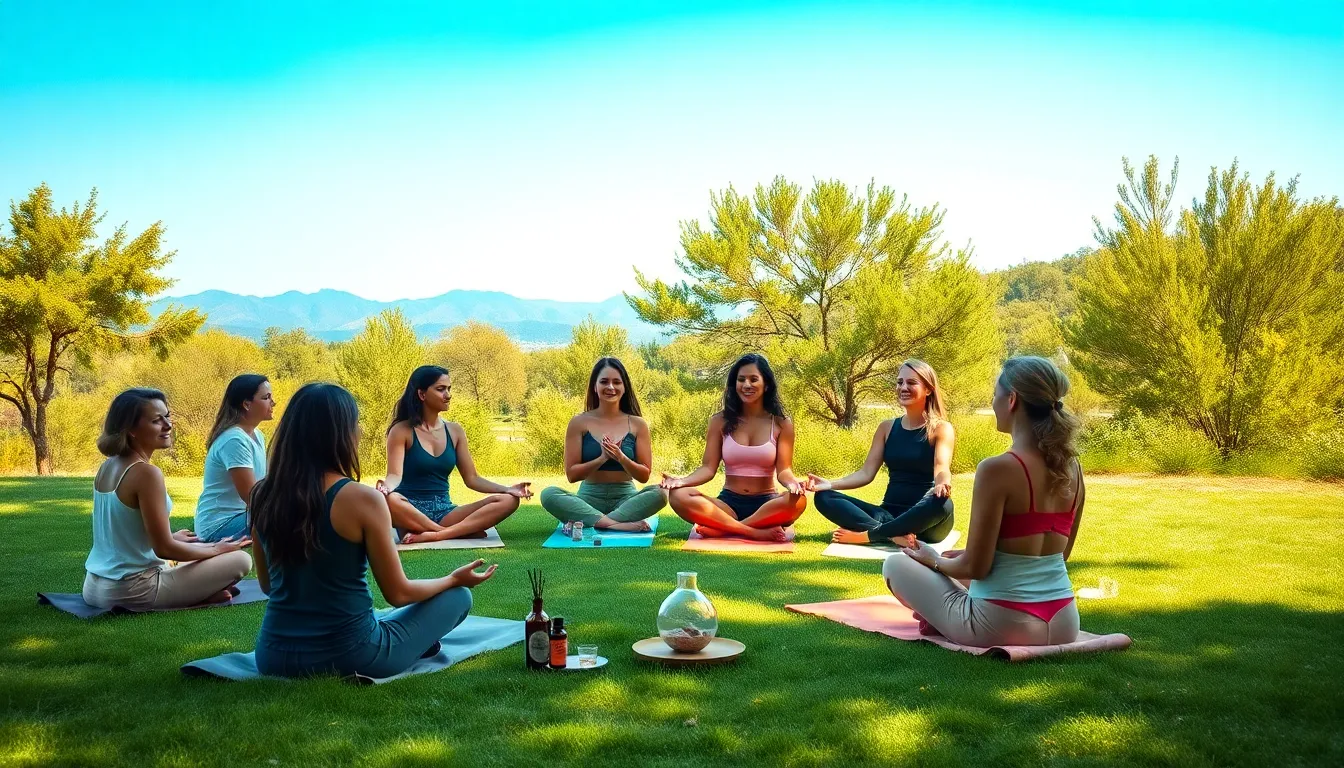Mental health retreats for women are more than just a trend: they’re like a spa day for your mind, minus the cucumber slices and, thankfully, with far more depth. Imagine stepping away from the chaos of everyday life, swapping your to-do lists for a little tranquility. Retreats offer a supportive environment where women can connect, recharge, and rediscover themselves. Whether it’s inner peace, emotional healing, or simply the chance to indulge in a bit of self-love, these retreats are designed to heal and empower. So grab your comfy yoga pants and let’s jump into the transformative world of mental health retreats for women.
Table of Contents
ToggleThe Importance Of Mental Health Retreats

Mental health retreats have become a beacon of hope in an increasingly hectic world. With demands spiraling and stress levels skyrocketing, the importance of mental health retreats cannot be overstated. These sanctuaries provide an opportunity to step away from the daily grind, allowing participants to focus solely on their emotional and psychological well-being. Women, in particular, often juggle multiple responsibilities, career, family, and personal aspirations, leaving little room for self-care. By attending a retreat, women can prioritize mental health, learn healthy coping strategies, and return to their lives feeling rejuvenated and empowered. The supportive atmosphere fosters connection and understanding among participants, turning individual struggles into collective triumphs.
Also, a retreat can help a radical mindset shift. When women spend time in nurturing surroundings, they often find clarity on personal issues, gaining insights that may have previously eluded them. This importance is underscored by the prevalence of anxiety and depression, making mental health retreats a critical touchpoint for many.
Benefits Of Attending A Retreat
Attending a mental health retreat brings numerous benefits that extend far beyond relaxation.
- Emotional Support: Being surrounded by like-minded women fosters safe spaces for sharing feelings and experiences. This camaraderie enhances the sense of belonging, essential for healing.
- Expert Guidance: Most retreats feature trained professionals, therapists, counselors, and life coaches, who provide valuable tools for managing mental health. Their insights can illuminate paths for personal growth that participants may not have considered.
- Holistic Wellness: Many retreats incorporate activities such as yoga, meditation, and nutrition workshops. These practices help harmonize mind and body, reinforcing the idea that mental health is intertwined with physical health.
- Digital Detox: In a digital age where constant connectivity can lead to feelings of overwhelm, retreats offer an escape from screens, allowing participants to reconnect with themselves in a more meaningful way.
- Skill Development: Participants often leave retreats with new skills to manage stress, navigate emotional challenges, and communicate more effectively, all crucial for sustaining mental health long after the retreat ends.
Types Of Mental Health Retreats For Women
Mental health retreats for women come in various forms, catering to diverse needs and preferences. Here’s a breakdown of a few popular types:
- Wellness Retreats: These centers prioritize physical health alongside mental well-being. They include activities like yoga, meditation, and healthy cooking classes.
- Therapeutic Retreats: Led by licensed mental health professionals, these retreats investigate deeper into individual issues. They often focus on specific themes such as trauma, grief, or anxiety management.
- Creative Retreats: For women looking to express themselves, creative retreats incorporate art, writing, or music therapy. This type of retreat encourages participants to explore their creativity as a form of self-discovery.
- Nature Retreats: Set in tranquil environments, these retreats harness the healing power of nature. They include outdoor activities such as hiking, guided meditations in serene settings, and eco-therapy.
- Spiritual Retreats: Merging mental and spiritual wellness, these retreats allow women to explore their spirituality through workshops, rituals, and mindfulness practices.
Choosing The Right Retreat
With an abundance of options available, selecting the right mental health retreat can feel overwhelming. Here are some key considerations to streamline the decision-making process:
- Define Goals: Understand what you want to achieve. Are you seeking emotional healing, relaxation, or personal growth? Clarifying your goals can guide your choice.
- Research: Look for reviews and testimonials. What do past attendees say? Recommendations can provide insight into the retreat’s effectiveness and fit.
- Facilitators: Examine the credentials of the retreat leaders. Are they licensed professionals? Their expertise can significantly impact your overall experience.
- Location: Consider where the retreat is held. Does the environment resonate with you? A peaceful setting can greatly enhance your retreat experience.
- Duration and Cost: Ensure the retreat fits within your schedule and budget. Weigh the potential benefits against the investment required.
What To Expect During A Mental Health Retreat
Expectations can vary greatly depending on the type and focus of the retreat, but there are common themes that participants can anticipate:
- Structured Schedule: Most retreats have daily agendas filled with activities ranging from workshops to group discussions. These structures foster a sense of security while encouraging participation.
- Reflection Time: A key part of retreats is the time set aside for reflection and personal journaling. This time allows participants to process their emotions and insights.
- Group Activities: Whether through guided meditations or team-building exercises, group interactions play a crucial role in fostering connections and sharing experiences.
- Physical Activities: Expect opportunities for physical engagement, be it yoga, hiking, or simply walking in nature. Movement is often integrated to enhance the healing process.
- Supportive Environment: Participants can anticipate a judgment-free space where vulnerability is encouraged and celebrated.
Personal Experiences And Testimonials
Real stories from women who have attended mental health retreats illustrate their profound impact. For instance, Sarah, a marketing executive, shared how a weekend retreat helped her address long-buried stress and leaves feeling reinvigorated and connected. She stated, “It felt like a weight lifted off my shoulders. I learned tools to manage anxiety that I still use every day.”
Similarly, Lisa, a mother of three, found solace in a wellness retreat that offered mindfulness activities and workshops. “I went in stressed and left feeling like a new person. I realized how much I neglected my own needs.”
These testimonials emphasize how retreats foster emotional healing and growth, showcasing real-life transformations that resonate with potential attendees.



